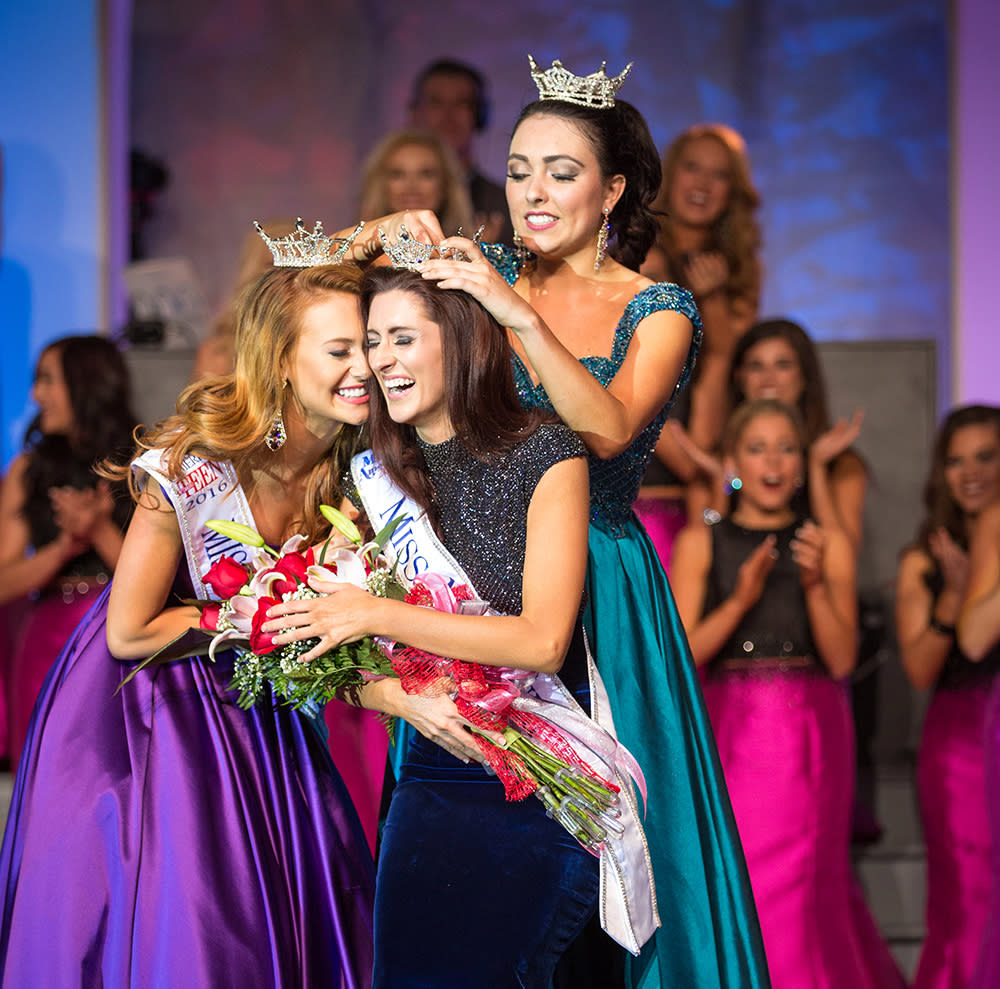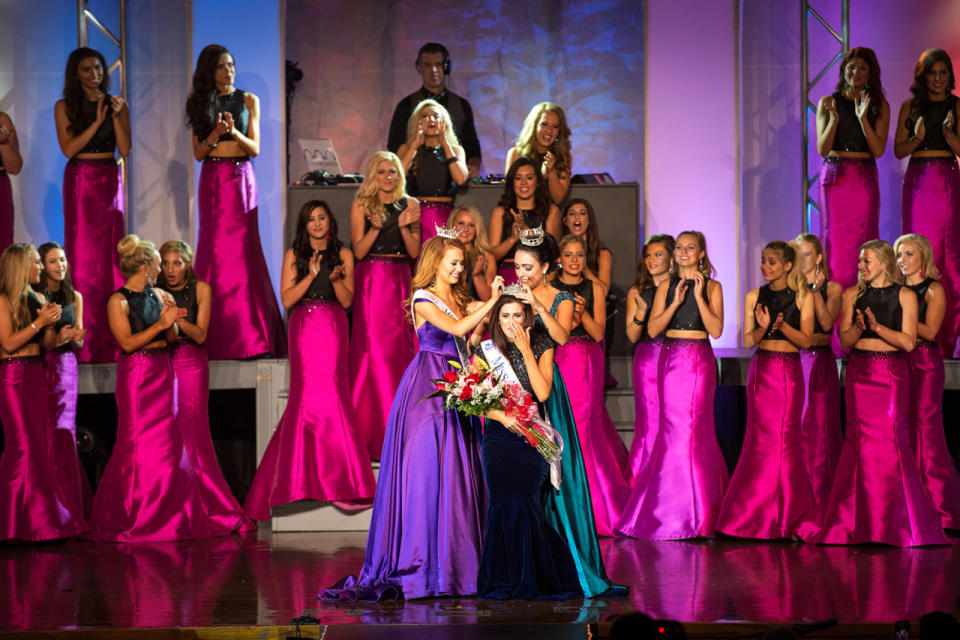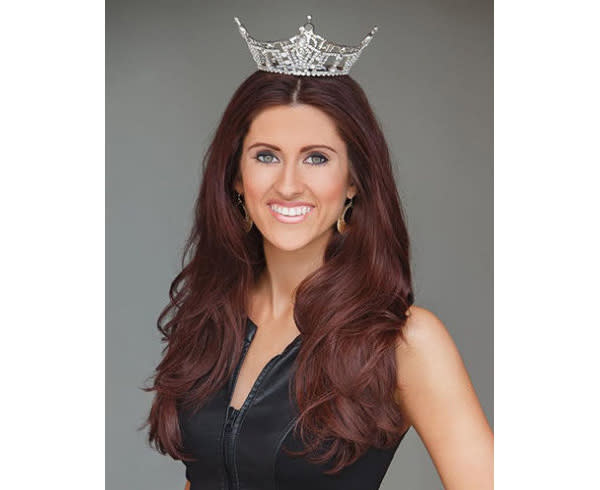This Woman Is the First Openly Gay Beauty Queen to Compete at Miss America

Erin O'Flaherty, 23, was crowed the 2016 Miss Missouri on Saturday night, becoming the first openly gay woman to win a state pageant leading to Miss America. O'Flaherty says she struggled with her sexuality growing up as a self-described “feminine girl” in Florence, South Carolina, and entered the pageant scene as a college student while still, publicly, in the closet. “Knowing I might be gay but also being very feminine was kind of confusing for me,” O'Flaherty told Cosmopolitan.com, “because I didn’t fit into the stereotypical category I had in my head for a woman in the LGBT community.” “It took many years of struggle to figure out who I was,” she continued.
Now, O'Flaherty wants to use her year as Miss Missouri to break boundaries, serve as a role model (not to mention prove that an out and proud lesbian pageant queen is as worthy of her tiara as anyone else), and advocate for suicide prevention, including a focus on the Trevor Project, an organization which is dedicated to preventing suicide among LGBT youth.

Why did you want to enter the Miss Missouri - how did you get into pageants?
It was during my freshman year at University of Central Florida. The Miss UCF at that time was a woman I looked up to - I wanted to have the influence on my community that she had, and so I decided to enter the pageant. In 2013, I was crowed Miss University of Central Florida! It was through that I came to learn about, and fall in love with, the Miss America Organization, and so my goals became bigger, and I continued my involvement [in pageants]. The Miss America Organization is a huge provider of scholarships for women also, and after I graduated from UCF, I had some student loan debt.
I actually had taken a couple years off [from pageants], and this year was going to be the last year that I would be eligible to compete because of my age. I just kept coming back to it, thinking, I still want to be Miss America. I felt like I wasn’t quite done yet. And all of the girls here [in Missouri] were really welcoming and really sweet, so it wasn’t as intimidating as you might think.
Were you always open about your sexuality when competing in pageants, or was coming out in this context a difficult decision for you?
It’s always been an internal struggle, deciding to come out in and of itself. But I never felt like I needed to hide it. I’m just not that kind of person. For the most part, my friends and close family I’ve always been out to, but I competed for one year before I was [publicly out] - and I knew that once I was open about it, I would actually do much better in pageants because I would know I was presenting who I really was. As I’ve become more and more open with who I am, and more comfortable with myself, that’s really translated into my performance.

Does your sexuality ever come up in preliminary interviews or during the on-stage Q&A round?
I like to tie in my personal platform of suicide prevention with my personal experience of coming out in the gay community, when you have reactions that are supportive and not supportive, and [wanting to] be a source of support for teens in the LGBT community that are going through the same thing.
It is pretty unheard of to be a gay woman in the Miss America system.
I do talk about it to the judges in that sense. Sometimes there are follow-up questions because it is pretty unheard of to be a gay woman in the Miss America system, but I wouldn’t say that there has been an interview at all when that was the only topic of conversation. They ask me about current events, they ask me about my platform, suicide prevention, they really ask about anything that piques their interest … They’ve always been really respectful. In my Miss Missouri interview, they asked me how my parents felt when I came out, which is a little bit of a personal question, but my parents were very supportive, so it wasn’t awkward at all, really.
And I’ve never experienced homophobia, at least to my face. Most contestants are very accepting of me, and [mostly] it doesn’t even come up.
You mentioned your platform is suicide prevention. Suicide is a huge problem in the LGBT community, especially among teens - do you plan on working with the LGBT community on this issue?
One of my best friends committed suicide when I was 13. As I navigated the grieving process, I became educated on the warning signs of suicide. It became my mission to spread this message - suicide is the second leading cause of death in individuals between the ages of 14 and 25, and the 11th leading cause of death, overall. And LGBT youth are actually eight times more likely to try to commit suicide compared to their straight peers. That’s really what the Trevor Project, an organization I do work with, is all about. They act as a resource for LGBT youth; so far, this year, there have been almost 11,000 calls, texts, and chats into their hotline. That’s really staggering.
Otherwise, the American Foundation for Suicide Prevention is another amazing resource. They hold an annual Out of the Darkness Awareness Walk in cities across the nation. Survivors of suicide - and by survivors of suicide, I mean somebody who has lost a loved one to suicide - come together and do a walk to remember those who have lost their lives to suicide each year.

As Miss Missouri, do you feel like you can be a role model for other young women in the LGBT community?
I hope so - that’s really my goal here. Growing up, I was very feminine. Knowing I might be gay but also being very feminine was kind of confusing for me because I didn’t fit into the stereotypical category I had in my head for a woman in the LGBT community. It took many years of struggle to figure out who I was. Femme lesbians are underrepresented in the LGBT community. They certainly exist, but many find it very hard to be accepted. Often, they are confused with being heterosexual. This was my experience - one of my best friends, actually, that I met my freshman year of college, we came out around the same time and we’ve had the same struggle. But I absolutely feel a part of the LGBT community now that I am older. I have been able to connect with other femme lesbians and I am so proud to be a part of this community. I hope that I can just reach someone that needs the help that I could have used back then.
As much as it might be scary for me to come into a conservative state and to be who I am, at the same time, people have greeted me with open arms.
Has it been hard to live in states like Missouri, South Carolina, and Florida where they are generally more conservative than others? Have you felt any pressure to stay closeted for pageants or in your personal life?
I would never, ever let anybody pressure me to do that. This is who I am and the judges chose me! I’m not the kind of person who is going to give in to that pressure, but I actually haven’t felt that much pressure. People have been very accepting so, as much as it might be scary for me to come into a conservative state and to be who I am, at the same time, people have greeted me with open arms. It’s really shown me that, here in Missouri, our politics doesn’t necessarily match our people all of the time. I know that there might be people who probably really don’t agree with it, but I’m just going to try to be the best Miss Missouri that I can be and show that [my sexuality] is only one part of me. My service to the state is what’s going to make me stand out to them.
Do you feel like you’ve broken a barrier? Does it feel extra special for you?
I do think it is a big deal to come into Miss America being open, because the visibility for the LGBT community is what we need right now. I’m just hoping I can be a voice to speak [on that].
Follow Erin on Twitter and Instagram; follow Amanda on Twitter.
